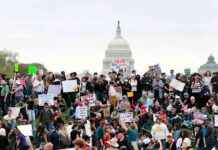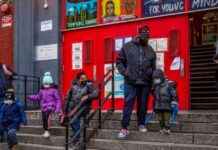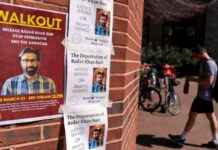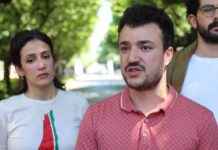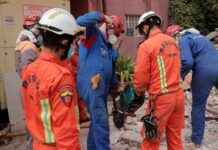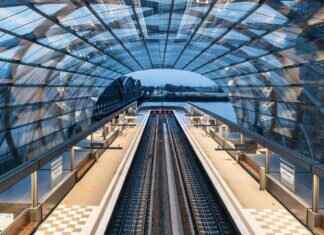Students from various universities in the Washington, D.C. area united in protest outside the U.S. Department of Education to push back against the administration’s plans to downsize the agency. The diverse crowd, consisting of college and high school students, raised their voices in opposition to what they perceive as a threat to education in the country. As chants of “hands off our schools” and “give us back our DOE” filled the air, attendees shared their concerns about the potential consequences of the department’s dismantling.
Julia Comino, the student body vice president at American University, articulated the sentiment of many when she emphasized the vital role of the Department of Education in safeguarding the rights of vulnerable communities. She noted that the agency plays a crucial part in ensuring equal access to education for individuals from various backgrounds, including different gender identities, races, and ethnicities. By targeting the Department of Education, Comino argued, the administration is, in essence, attacking marginalized groups, perpetuating a troubling pattern of disregard for their needs and rights.
President Trump’s recent executive order, which directed Education Secretary Linda McMahon to reduce the size of the department and transfer control back to the states, sparked outrage among students who fear the repercussions of such a move. Asher Maxwell, a student press coordinator at Georgetown University, expressed concern about the potential impact on educational quality and opportunities for future generations. The administration’s actions, he warned, could severely undermine the educational prospects of students across the nation.
Student-Led Advocacy
The demonstration at the Department of Education was a collaborative effort organized by student governments representing over 130,000 students from multiple colleges, including Georgetown University, American University, Howard University, and Temple University. This unified front against what they perceive as an assault on education, encompassing issues such as free speech on campuses and student financial aid programs, underscores the seriousness of the students’ concerns. By protesting the proposed changes that could jeopardize federal student aid programs and other crucial services, the students are standing up for their right to equitable and quality education.
Ethan Henshaw, a recipient of Pell Grants and Georgetown’s student body president, emphasized the pivotal role of the Department of Education in providing essential support to students seeking to improve their lives through education. Henshaw’s personal experience highlights the transformative impact that educational opportunities can have on individuals from diverse socioeconomic backgrounds. His impassioned plea to preserve the agency’s programs resonates with many who view education as a pathway to upward mobility and personal growth.
Political Backlash and Resistance
The students’ rally at the Department of Education is part of a growing wave of opposition to the administration’s education policies. Democratic lawmakers, including Senator Elizabeth Warren, have launched campaigns to challenge the proposed dismantling of the department and the potential consequences for public schools. Senator Warren’s “Save Our Schools” initiative aims to mobilize public support and legal recourse against what she sees as a misguided attempt to prioritize profit over the well-being of students.
While the administration cannot unilaterally abolish the Department of Education without congressional approval, the threat of such drastic measures has already begun to impact educational institutions. Darius Wagner, the Vice President of the Georgetown University Student Association, highlighted the chilling effect that the administration’s rhetoric and actions have had on campus discussions and academic activities. By questioning the autonomy of educational institutions and imposing restrictions on free speech, the administration’s policies risk stifling intellectual inquiry and diversity of thought within educational settings.
As students continue to voice their concerns and advocate for the preservation of the Department of Education, the broader implications of these protests extend beyond the immediate policy changes. The fight for educational equity and access is a fundamental aspect of shaping the future of the country, and the students’ determination to defend their rights is a testament to the power of collective action in safeguarding democratic values and educational opportunities for all.



